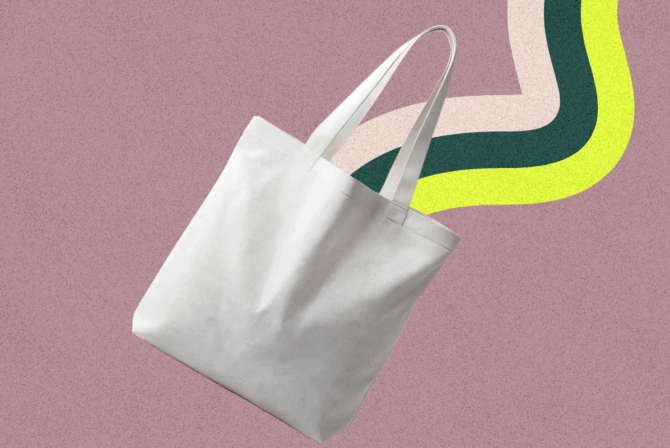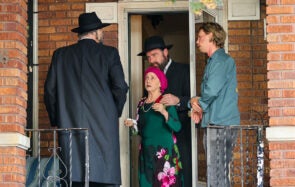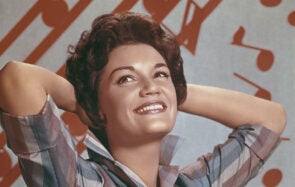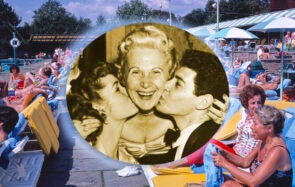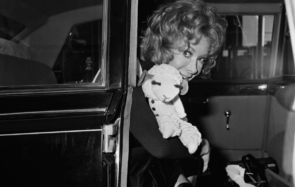February is Jewish Disabilities Awareness Month. In honor of JDAM, we’ll be publishing a series of articles related to parenting and disabilities. Every Tuesday of this month, we’ll publish pieces that are specifically about the different ways in which parents of kids with special needs approach the Jewish ritual of bar and bat mitzvah. On Thursdays, we’ll publish posts concerning a wide range of issues that parents face when caring for a child with special needs. We hope you’ll read, share and join in this important conversation. This series is in partnership with the Ruderman Family Foundation.
Planning a bat mitzvah for my daughter, who has special needs, touches on raw and complex emotions that I sometimes keep buried deep below the surface. But the other day in yoga class, lying in savasana, my mind wandered. Free of distracting thoughts, emotions rose to the surface and tears wound their way down my cheeks. The complexities involved in planning a bat mitzvah for my daughter, who may or may not have a clue as to what a bat mitzvah really is, hit me.
My daughter Mira has significant cognitive delays, is non-verbal, and is very challenged physically. The fact that she will become a bat mitzvah is amazing! Our synagogue welcomes her with open arms and they are excited to have her pave the way as their first special needs bat mitzvah. Gateways, the organization that has worked with Mira over the last six years, has kept my confidence going and, over the years, they have broadened our understanding of what a bar or bat mitzvah can look like. The people who work at Gateways make it possible for every child, despite their special needs, to become a bar or bat mitzvah.
In our planning, some tasks have been easy, such as choosing the food we will serve at the celebration, and giving the DJ a playlist for dancing. Also clear were the roles her brothers, ages 16 and 7, will have. Noah, the older brother, will read Torah, and Micah, the younger brother, will dress the Torah and lead some blessings. We haven’t had discussions or debates about what Mira wants her service to be like, about her Torah portion, or about how she wants to celebrate.
But then there were the surprisingly difficult aspects of our planning process, like buying a dress, picking out Mira’s tallit (prayer shawl), and contemplating expectations of others and myself.
I was convinced Mira should have a tallit. Feeling awkward and embarrassed, I walked into a lovely Judaica store not far from my home and explained to the young woman who worked there, “I’m picking out a tallit for my daughter. She isn’t with me because she hates shopping and I’m not sure she cares about a tallit or even knows what one is.” Two hundred dollars later, I left the store with a beautiful hand-dyed silk tallit, flowing with rich shades of blues and purples and a heavy heart, filled with loneliness.
There were other contributors to the loneliness of planning this bat mitzvah as well. Mira can’t read English, let alone Hebrew, and I questioned at times how she was going to pull this off without it seeming like a very programmed and rote ceremony where she simply pushes a button on an iPad. And not knowing how Mira understands a bat mitzvah led me to feel like much of the process was one-sided, as if my husband and I were doing the planning and we were plugging her in to do her part.
But I remind myself that this is about Mira becoming a part of the Jewish community. This bat mitzvah is for her, as much as it is for friends and family to see her, experience her, and embrace her as a member of that community, a member who is capable of learning as well as teaching. It is about my boys and their friends, as well as ours, seeing that despite her differences, Mira is whole. It is about a moment in time where we, as parents, feel a bit of normal, as Mira goes through a traditional ritual like so many other girls her age.
Mira has attended Gateways’ b’nei mitzvah program for the last two years, and every Wednesday afternoon as well as a Sunday morning program for over six years. At Gateways, she works with an individual tutor and a teacher, along with several other students who have special needs. They all work tirelessly and with a great deal of pride and fun to learn the blessings, read Hebrew, and gain familiarity with the service.
Many people are wondering what in the world will Mira’s bat mitzvah be like? How can she read Torah? How will she sing the blessings? How will she deliver a d’var torah? Several years ago, these same questions were on my mind, and the thoughts that accompanied those questions rested on fears and concerns that people might be disappointed. When I mention the bat mitzvah to Mira, I don’t have any idea if she is connecting the word to her bat mitzvah class, the blessings that she is learning, her friends from class, a previous bar or bat mitzvah she attended, or the big day when relatives and friends from around the country and nearby will gather around to celebrate this milestone in her life. I am pretty certain that she is not thinking about the service or the party and isn’t thinking about the gifts that will arrive by mail and in person.
But as time passes, I realize that planning this bat mitzvah has allowed me to acutely tune in to what really matters and what will be meaningful to Mira: the opportunity to lead the community in prayer, song, and ritual, distractions and mistakes included; being surrounded by friends and family; a celebration of good food and dancing. It matters that on this day, Mira is the center of attention and we will focus on what she can do, and not what she can’t.
What I know for certain is that when Mira touches a picture representing a blessing recorded on her iPad, and the familiar voice of her teacher brings it to life, her inner light illuminates her being from head to toe, her mouth alternating from smiles and happy squeals to concentrated mouth and tongue. Her body and soul fill with connection, joy, and confidence, as she rocks out in her wheelchair to the Shema and Mah Tovu prayers. She trembles with excitement and love of her Judaism. What more could we, as her parents, wish for, than a daughter who derives such pleasure from the Judaism that belongs to her and has only been made accessible by an organization of people that believes at its core that every Jewish child deserves a Jewish education?
Mira has taught me, along with this process of her becoming a bat mitzvah, how to let go of what we can’t control and what doesn’t really matter, in order to embrace, enjoy, emanate and trust the true meaning of the experience.
Photo credits: Jordyn Rozensky, Gateways




